|
When I reviewed the MGM special edition DVD of Rollerball back in 2005, it wasn't because the disc was a new release. In fact, I'd missed the release date by a good three years, and big, self-important players like MGM tended not to send review discs to small fry like us, or even acknowledge that we exist, if the truth be told. No, the reason I reviewed it was because having first seen the film in my youth when it was unleashed into UK cinemas, I was struck by how differently I perceived it as an older and more politically aware adult. As a teenager I was turned on by the violent action sequences but recall mentally fast-forwarding the scenes in between. As an adult I was still dazzled by the brilliance of those same action sequences, but now it was the personal drama and the forward-looking nature of the political commentary that really hit me. This was a film made in 1975 that painted a dark portrait of a corporate controlled future society that in 2005 was looking increasingly plausible and is now on the brink of becoming reality.
So what's changed since 2005 that prompts me to write a new review of a film that I've already covered in some detail and with a thoroughness I'm still reasonably happy with? Well, I could argue that I missed a few details in the earlier review that I wanted to flesh out, and to that end some of the content of this review will be borrowed and updated from the earlier piece. But what really has changed is that what looked foreboding in 2005 is now looking altogether more alarming, with one aspect in particular set to negatively impact on those who will have no say in the terms of its inception. And the potential consequences were all laid out forty years ago in this excellent piece of thoughtful, political, science fiction action cinema.
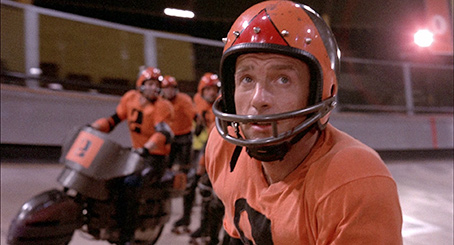
If you're new to Rollerball, and I'm talking specifically about the original 1975 Rollerball, not the wretched 2002 remake, then let me first set the scene. In the not too distant future, all wars have been eliminated and the concept of national sovereignty has effectively been dissolved. Societies around the world are now ruled by six huge multinational corporations that exercise ultimate power over ordinary citizens, with the privileges that come with wealth and power reserved almost exclusively for what is known as the Executive Class. The principal sporting distraction for the masses is Rollerball, a violent and gladiatorial game designed as both as a release valve for the negative emotions of the viewing public and a demonstration of the futility of individual expression against the might of the corporate state. It is a game that is designed to have no stars, no heroes to challenge the status quo, yet one has nonetheless emerged in the shape of enigmatic and high-scoring Houston captain Jonathan E. After another notable win for Houston, the Executives decide he should be removed from the game, and Bartholomew, the head of the Houston based Energy Corporation, meets with Jonathan to inform him that he must announce his retirement. But when Jonathan refuses to cooperate, a series of increasingly lethal rule changes are introduced, the aim being to crush Jonathan's rebellious nature and permanently remove him from a sport that has become his life.
A key problem facing any forward-looking science fiction film is how to create a future world that is both convincing and that will stand the test of time, as real world technological developments overtake those of even the most imaginative filmmakers. This second aspect wasn't always an issue, as films were once not seen as having a life beyond their initial release, but the arrival of television reruns and home video in all of its still evolving guises has dated even the most forward thinking futuristic genre tales. To some extent, this is inevitable. After all, if a film's director, production designer and art director were able to accurately predict just how technology would evolve in the years to come, they'd probably be working for corporations themselves, creating shiny and expensive products that we have no real need for but become sold on the idea that we just must have. Even the otherwise still convincingly technology in Kubrick's 1968 2001: A Space Odyssey occasionally fell foul of this, as the Jupiter One astronauts watch a news broadcast on what look uncannily like iPads, but the broadcast itself is still in low definition black and white and saddled with the most basic of title graphics and theme tunes. The designers on Ridley Scott's Alien were smart enough to borrow from the more generic elements of the fashions and industrial technology of today to avoid having the costumes and corridors of their ship date one iota in subsequent years, but the ship's computer still requires all enquiries to be typed in using one of close clacking old school keyboards, and displays them as low res green text of a monochrome CRT monitor. Then again, who knew?
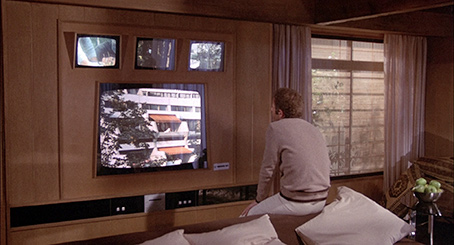
It's thus no surprise that some of the future technology of Rollerball has not aged so well. Computers are once again the main culprit here, and TVs still have a 4:3 aspect ratio and the slightly curved edges of CRT screens. But in terms of how that technology would come to impact on the way we view and access information, the film's predictions are sometimes uncannily on the nose. At a time when televisions were unimposing boxes in the corner of the living room, Rollerball envisioned a future where TV screens would be huge and mounted into the wall in a manner that has become the standard in the homes of today. The four-screen 'Multivision' may not have appeared in the form presented here, but as younger viewers in particular seem able to digest information simultaneously from multiple devices, and TV news channels ask us to watch, listen and read a range of information at the same time, the concept itself has still effectively come to pass. In Rollerball books have become redundant and have been summarised into bite-sized electronic forms for easy consumption by a proletariat that no longer appears to have a thirst for knowledge or intellectual stimulation – all they need is on Multivision or in the Rollerball arena. "What do you want books for?" asks teammate Moonpie of Jonathan shortly before he hits a brick wall in his search for information on the suggestively named but never clarified 'Corporate Wars'. This again plays like a portent of changing times – a few years ago a college librarian friend of mine recently was told by a lecturer: "Why would my students need to use a library? They have the internet now." The Executives even hold international meetings via what is effectively video conferencing, technology that would not appear in the real world for a number of years.
But what really hits you forty years on is the troubling accuracy of the film's political predictions. The division of society into an essentially powerless proletariat and a small but all-powerful ruling elite has been a mainstay of science fiction cinema since Fritz Lang's 1927 Metropolis, and has its real world roots in pre-industrial revolution economies the world over. But what struck me back when I first wrote about Rollerball in 2005 is that it's specific vision of the world – one in which the concept of elected national governments has been supplanted by a small core of giant conglomerates, each with a monopoly on our basic needs and even our wants – was actually in danger of being realised in the not too distant future. I found myself re-evaluating a film I had enjoyed as a teenager for its violent action as one of the most visionary cinematic dystopias of the decade, and possibly in all of modern science fiction cinema. But what once played as a chilling parable on the increasing power of multinational corporations plays ten years on like a chillingly accurate picture of things to come.
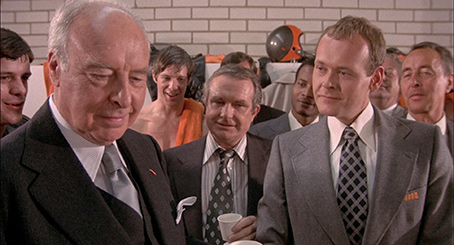
There have, it has to be said, been a few unexpected shifts in the balance of corporate power in the past decade (ten years ago, who could have foreseen that Microsoft would be on the back foot and Apple would be sitting on enough cash to eradicate world poverty?), but it's still the corporations that have the biggest clout. In the UK at least, the situation has been worsened by a government that believes in unregulated capitalism and seems to reward corporate immorality and tax dodging as long as it's done on a monumental scale, legislating in their favour and funding their tax breaks by punishing the poor, who are kept in line with a steady diet of misinformation and social media-savvy propaganda. But there's more. Being negotiated right now behind closed doors is a trade agreement over which you, as British citizens (apologies to our non-British readers, but read on anyway as the likelihood is that you'll be similarly affected) will have absolutely no say, but which will almost definitely impact on your lives, your county, and the very concept of democracy. Called the Transatlantic Trade and Investment Partnership, or TTIP, it will potentially allow unelected multinational corporations to override decisions made by the democratically elected governments of the European countries who sign up to the agreement. Thus if a British government – and I'm thinking one that actually gives a flying fuck about its people, not this current collection of freeloading cocks – refuses to sell off elements of the National Health Service to an American health care corporation, that corporation can potentially sue the government and force them to do so, overriding the wishes of citizens who may well have voted a party in on their pledge to protect the NHS (and by this I mean really protect it, not lie through your arse about something you despise in a cynical attempt to win the idiot vote – yes Nigel, you hypocritical shit, I'm talking about you). As a result, even if the vast majority of British voters are in favour of protecting the NHS from such mercenary sell-offs – as recent polls suggest they are – it potentially counts for nothing if a giant multinational is determined and rich enough to take on a government that has neither the cash reserves nor the willpower to stand in its way.* And if this multinational is powerful enough and does this in enough countries to effectively swallow up the competition, I'd say we have Rollerball's Health Corporation, and the first concrete step towards the film's corporate dystopia will have been taken.
As the divisions in our own society widen, and a party comprised of public school educated multi-millionaires gives more power to the privileged and strips the poor of their rights and access to justice, the concept of a super-rich ruling elite is not so far fetched and in many senses is already firmly in place. In the world of Rollerball the situation has been formalised and the power of the so-called Executive Class increased to the point where if an Executive wants the wife of a regular citizen or even a Rollerball player, then he is able to take her and there is nothing you can do to stop him. A more cynical person, of course, might argue that the lure of power and luxury has already enabled them to do just that.
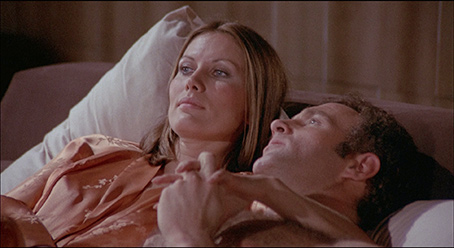
Like the ludicrously overpaid sporting superstars of today, the Rollerball players are allowed to share many of the privileges of the Executive Class, and have become cocooned in a world that separates them from the almost faceless citizens who flock to the Rollerball games – they work together, party together, and occasionally even get to mix with their Corporate masters. Their (and the film's) only real dealings with the ordinary folk are the women supplied to the players by the Corporation as 'companions' as rewards. After ten years in the game, even this has become an all-too-familiar and ultimately vacuous aspect of sporting life for Jonathan. "I'm Daphne," announces the latest arrival by way of introduction. "Yeah, that figures," is Jonathan's weary reply. Women get a particularly raw deal in this grimly patriarchal future, being playthings for Rollerball players and Executives alike and hopelessly under-represented in the corporate world (now there's a thing...). It's not hard to understand the almost animalistic relish with which a group of them brandish a destructive weapon after a party, greedily laying waste to a line of tall trees after an evening digesting the violence of Rollerball clips on Multivision. Designed as a critique of the cruel depravity the ruling class, it's also easy to read the sequence as a metaphor for the destruction being unleashed on the environment by any number of current multinational corporations.
The brutality of the game is obviously a central issue, one doubtless inspired by the increasing levels of violence in and around key sporting events of the time, a trend that also gave rise to satirical works such as Paul Bartel's Death Race 2000 and George Roy Hill's Slap Shot. The game's gladiatorial nature can't also help but reflect a modern mass-market fascination with confrontational reality television, shows on which people are placed into situations in which they will inevitably come into verbal and even physical conflict for our supposed entertainment. This element of the film apparently fell on largely deaf ears on its initial US release, and on his commentary track director Norman Jewison expresses his horror at the news that after seeing the film, one Texan entrepreneur actually tried to organise a real-world Rollerball league.
But in that respect Jewison and his talented crew were victims of their own collective vision. In order to sell the Rollerball matches as real sporting events, they had to create a game and give it a set of easy to follow rules, one that we would buy as a genuine sporting event, and this they did with astonishing aplomb. Despite being a product of pure invention, Rollerball feels like the real deal from the opening frames, one whose arena has been designed with functionality in mind and whose objectives quickly become clear without any verbal or textual assistance. The appealing physicality and excitement of the game are thrillingly communicated in the opening match, as brilliantly conceived, shot and edited a set piece as you'll find anywhere in modern science fiction or even action cinema. The stunt performers, pro skaters and actors really rise to the occasion here, moving with the speed, fluidity and coordination of men who have been playing the sport at professional level for a number of years. Under the direction of ace cinematographer Douglas Slocombe, their every move is kept in frame and sharp focus by a team of crack camera operators, some of whom had covered sporting events at the Olympic Games, adding to the feeling that we are watching a real sport rather than a constructed dramatization. Antony Gibbs' editing of this footage is an action sequence masterclass, cutting rapidly but always with purpose, creating a narrative as easy to follow as any live sporting event and getting the adrenaline pumping without ever resorting to the sort of machine-gun editing that is too often employed to artificially up the pace of such sequences today.
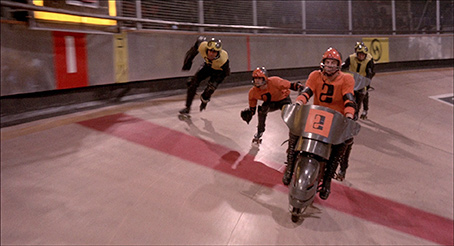
In my earlier review, I reflected on the dichotomy of beginning a film that is ultimately critical of sporting violence with a sequence that portrays it in such a seductive manner, but this time around it seemed clear that this was always Jewison's intention. The film is structured around three Rollerball matches, each more violent and destructive than the last, and initially we are invited to be as seduced and excited by the sport as the viewing public. Only later, as the rule changes designed to force Jonathan out of the game are introduced, are we asked to re-examine our response to this orchestrated violence and question its validity as an outlet for public aggression. By the time we reach the final match, which has been effectively rigged to be a fight to the death, all of the game's supposedly positive aspects have been stripped away to reveal the barbarity that sits at its core. But by taking the game to such an extreme, the Executives have failed to foresee its potential as a tool for disrupting the status quo, in the process transforming a rebellious sportsman into a potential revolutionary leader, one charismatic enough to fire up even representatives of the class that sought to bring him to his knees. Wow, those political metaphors just keep on coming, don't they?
In a bevy of solid performances, two in particular stand out. As Energy Corporation Executive Bartholomew, former Orson Welles collaborator John Houseman proves a real casting coup. His calmly authoritative diction, Mid-Atlantic accent and faux-friendly demeanour present Bartholomew as a seemingly well-meaning uncle who believes he knows what's best for his charges and expects them to take his advice or suffer the consequences. He never overtly threatens Jonathan, but then he doesn't need to – like so many in positions of extreme power, he is well aware of the influence he is able to exercise should the situation demand it, and this comes through clearly in every word he says to Jonathan and every look he gives him, even in the way he moves and carries himself.
But for all the right reasons the film belongs to James Caan, whose enigmatic performance as Jonathan E is for my money one of his very finest, not least because – and this may seem an odd claim to make given the subject matter of the film – it is also one of his most restrained. From the moment Bartholomew asks him to consider retirement, Jonathan is wrestling with a number of inner torments, from the decision he has to make about his future and the potential consequences should he refuse to cooperate, to his increasing dissatisfaction with the manufactured nature of his life and the pain of having had to surrender his wife to an Executive. And it's all there in Caan's face, every uncertainty, buried hurt and trace of suppressed anger at his lack of control over key aspects of his own life. It's in the quietest of moments that this really comes through, as he hovers on the periphery at an Executive party observing the reactions of those whom he ultimately serves and their slavering responses to slow-motion footage of his most violent tackles. Even in the Rollerball arena doing high velocity battle against increasingly aggressive opponents, Caan comes across as a professional sportsman with a passion for the game rather than the shouty high school jocks of John McTiernan's lamentable remake.
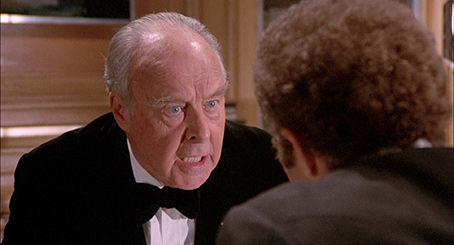
A strong supporting cast – that includes John Beck as Moonpie, Moses Gunn as Houston trainer Cletus and a typically intense Shane Rimmer as team manager Rusty – serves the film well. The only character I'm not so sure about is Ralph Richardson's slightly dotty Librarian. Although likeable in himself, his bumbling interaction with Jonathan, strategically placed to lighten the tone after the grim conclusion of the Tokyo game, plays like a would-be comedy sequence in a film that has absolutely no need of such a scene.
Many have championed Rollerball as a solid melding of action movie and forward-looking political science fiction cinema, but for me it's so much more. In action cinema mode it's as gripping as they come, as a character drama it's compelling, and as a social critique and a warning of things to come it can now be seen as a genuinely visionary work. But it's the seamless fluidity with which these elements come together that make the film feel so special forty years on. Immaculately directed, photographed and edited, superbly designed (let's give a serious shout for production designer John Box and art director Robert Laing) and boasting a top flight cast and some of the best stunt work anywhere in 70s cinema, Rollerball is, for my money, one of the all-time great dystopian science film films, and one that actually seems to just keep getting better with age.
When I reviewed the DVD, I suggested that the film was probably shot on high speed stock, and that this would account for the visible picture grain on that transfer. Looking at this new HD transfer, produced by MGM and made available for this release through Hollywood Classics, I'm happy to eat those words. The film looks superb here, with a crisp level of detail and rich colour reproduction (the orange of the Houston uniforms has the sort of warmth that I still only associate with acetate based film), while the pitch of the contrast is always spot on and intermittently sublime. The Rollerball matches themselves look terrific, but it's the mid-shots and facial close-ups in the quieter scenes – which on occasion have an almost pastel quality to them – where the image really shines. As you would hope, there's hardly a mark or dust spot to be seen and the picture is rock solid. An excellent transfer.
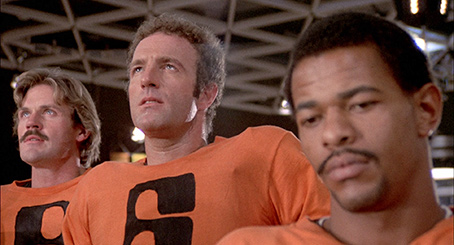
For the soundtrack you can choose between DTS-HD Master Audio 5.1 surround and Linear PCM 2.0 stereo. Both are effectively stereo tracks with clear separation of effects during the matches, but the DTS-HD track feels just a little richer, though the dialogue sometimes seems a tad crisper on the stereo track. Both are clean and with a decent dynamic range for a film of its vintage.
You can also watch the film with an isolated music and effects track, which in the case of the Rollerball matches is remarkably close to the final mix. As with the best of such tracks, this does play a bit like a commentary-free lesson in sound design and Foley work, which on this film are both top notch.
Some of the extra features here have been ported over from the 2002 MGM Special Edition, but given their quality you'll find no complaint here. My comments on those particular extras have been adapted from my review of the DVD.
Audio commentary with director Norman Jewison
Recorded in 1997, I'm presuming for an earlier laserdisc release, the slow talking Jewison covers a lot of ground here, including the process of constructing the Rollerball rink and stadium, the selection of camera operators and the game commentator, the casting of the key roles, the iconic use of music, and his very real fear that someone was going to be killed in the process of filming the matches. He goes into considerable detail on the tree-burning sequence, which he describes as "one of the cruellest moments in the film," providing reassuring detail over how they were able to stage this without harming any living trees. He also goes into some depth regarding the film's political elements and how they are still relevant today, drawing parallels with modern Middle Eastern conflicts and how some of us think that maybe, just maybe, they are actually all about oil. You don't say. This is clearly a film he remains proud of, and he looks back at the 1970s as time when he had more creative freedom: "I was allowed in those days to make a film with a little bit more depth to it," he reflects, "a little bit more grace."
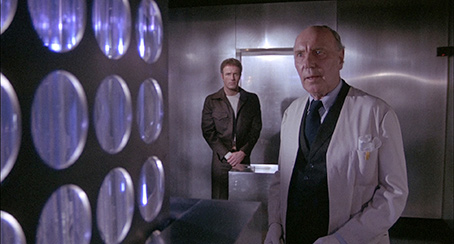
Audio commentary with writer William Harrison
Harrison was the writer of the original short story, Rollerball Murder, on which the film was based, and also authored the film's screenplay, which was his first. Although there are a few dead patches here and there, when Harrison talks he delivers, particularly when providing background detail on the writing of the story, and his observations about the increasing violence in sport and the rise of multinational corporations are right on the nose. He talks about elements he wanted for to include in the film that were ultimately shelved and the things he learned from Jewison, and he analyses the narrative function and subtextual intentions of some scenes in captivating detail. There are also some nice anecdotal stories and some reflection on the how reality appears to be catching up with his original vision. I was pleased that he commented on the abbreviated names on the Houston-Madrid scoreboard at the start – 'Hou Mad' looks at first glance like 'How Mad' – something that stayed with me from my very first viewing.
Return to the Arena: The Making of Rollerball (25:05)
A retrospective documentary on the making of the film ported over from the MGM DVD that includes interviews with director Norman Jewison, screenwriter and author of the original short story William Harrison, editor Anthony Gibbs, stunt coordinator Max Kleven, actor John Beck and stunt man Walt Scott. This is a brisk, informative and engaging look back at the film, with Jewison, Harrison and Beck very aware of how the world is moving ever closer to the film's prophetic vision. The writing, casting and creation of the film is covered, as is the process of designing the game and, eventually, working out the rules. Some behind-the-scenes photos and footage are welcome. Framed 1.33:1, this appears to have been re-mastered for this release.
Blood Sports with James Caan (10:58)
The affable Rollerball star kicks off by noting how the idea of a world run by corporations no longer seems far fetched, then recalls training on skates for weeks only to arrive in Munich and discover for the first time that half of the track was at a 30 degree angle, which none of them had prepared for. He also talks about one of the key themes of the film ("heroes breed revolution") and even briefly mentions a once proposed sequel, which frankly the film does not need.
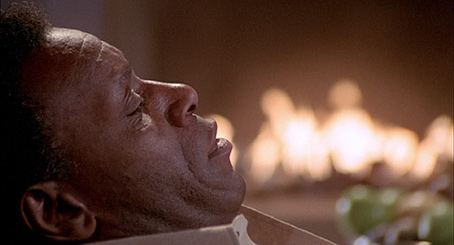
The Fourth City: Shooting Rollerball in Munich (18:55)
A look back at three of the key Munich locations used in the film, each selected for their futuristic design – the BMW Towers, the BMW Museum and the Audi Dome, the interior of which housed the specially constructed Rollerball track. The key contributor here is German unit manager Dieter Meyer, who talks about finding the locations, constructing the track, redressing it to look like three different rinks, and the tricky task of recruiting Japanese looking extras in Munich, which in 1975 had next to no Japanese community. Actor Jimmy Berg, who played one of the Houston team rookies, looks back on the making of the film from within the Audi Dome (having lived in the city for 25 years, for him it was like coming home), and Audi Dome manager Moritz Breitner recalls the Dome's restoration and does a bit of a sales pitch for it in its usual role as a basketball arena.
The Bike Work: Craig R. Baxley on the Motorcycle Stunts in Rollerball (17:33)
Stunt man Craig R. Baxley, who plays the lead biker on the Madrid team, recalls the formation of the stunt and skating crew (American stunt men and roller derby skaters, English roller hockey players and German speed skaters), shooting specific stunts, the importance of protecting the stars and at the same time making them look good, the action camerawork and more. He has high praise for Norman Jewison and clearly idolised James Caan, but admits to being disappointed by his first viewing of the film because it didn't fully capture his own experience of playing the game. Like many others in the extra features, he reflects on the film's uncannily accurate predictions about corporate power and overpaid and over-privileged sportsmen, and dismisses the remake as "laughable".
From Rome to Rollerball: The Full Circle (7:56)
This is the original EPK, which although formulaic in structure contains a useful collection of interviews and on-set footage from the time of the film's production. Given the purpose of the featurette, the tone is surprisingly sombre, reflecting the film's downbeat view of the future. Framed 4:3, the picture quality is inevitably a little rougher than on the retrospective documentary, but in contrast to the vast majority of EPKs we get to see, this is a welcome inclusion.
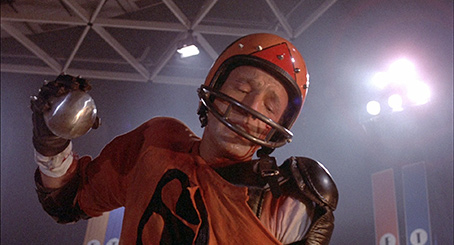
Original Theatrical Trailer (2:56)
Not as superficially slick as much of the promotional material being churned out now, this is nonetheless very persuasively assembled and in pleasingly good shape.
Theatrical Teaser (0:58)
A nicely edited sell, though it is voiced-over by Trailer Voice Man's serious 1970s cousin.
TV Spots (1:33 total)
There are three of these, all smartly edited and based on the Teaser Trailer.
Booklet
Given that the central piece of this typically well produced booklet is an essay by James Oliver titled Zero Sum Game – The Politics, Paranoia and Prescience of Rollerball, and the fact that I had always planned to expand on my own earlier political reading, I deliberately avoided this until after I'd finished writing my review. I needn't have worried – Mr. Oliver's analysis differs markedly from mine and, I would argue, has considerably more depth and a little less righteous anger (but as John Lydon once memorably sang, anger is an energy...). It's a very worthwhile read, and is accompanied by some good stills (I particularly liked the Houston Team photo), plus some graphics and credits for the film.
I'm partisan here, having enjoyed the film immensely in my youth and rediscovered it anew in 2005 and been astonished by the chilling plausibility of his future prophecy. Ten years on and it looks better than ever in every sense of the word – a great film, a superb transfer and a splendid collection of fine extra features. If you haven't already done so, go out and buy Arrow's superb Blu-ray right now.
* If you're new to the whole concept of the TTIP, this UNISON produced wakeup video is as good a place as any to start: https://www.youtube.com/watch?v=f8F0UmbcSwg
|